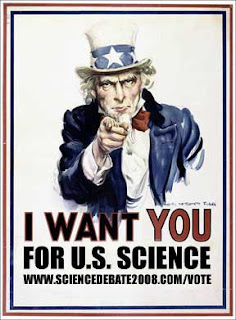 It's been a while since I have mentioned ScienceDebate.org. This is an organization dedicated to revitalizing the position of science within public awareness and the policy-making decision process. This is something I feel strongly about: the role of science is critical with regards to many of the worldwide issues facing us today. Whether it is climate change, alternative energy, conservation, or medicine - the information that we will need to make decisions and set policy will come from the research and data that science produces.
It's been a while since I have mentioned ScienceDebate.org. This is an organization dedicated to revitalizing the position of science within public awareness and the policy-making decision process. This is something I feel strongly about: the role of science is critical with regards to many of the worldwide issues facing us today. Whether it is climate change, alternative energy, conservation, or medicine - the information that we will need to make decisions and set policy will come from the research and data that science produces.And yet society has lost touch with much of the scientific world, seeing science as obscure or irrelevant. But, especially today, that couldn't be further from the truth. And whose to blame? Well, it's a little bit between both sides. Society has lost interest in science, perhaps with the end of the space race. By reaching the moon, one of the most momentous goals was reached by man and we have perhaps been living in the letdown of that event ever since.
But the science community has also allowed that to happen. By not making mass communication a vital component of their research, by not realizing that reaching the layman with the results and implications of their research is almost as important as the research itself, they have stepped back into the academic shadows and must now fight for attention and funding.
ScienceDebate.org tries to close that gap. Here is a link to two video clips from their web site: an MSNBC interview with Chris Mooney, ScienceDebate's founder, and a portion of a speech by Vice President Al Gore to a group of scientists at a meeting of the AAAS. I found both clips very interesting.
According to Chris Mooney, a recent survey showed that 84% of scientists believe that global warming is man-made (so there is some room for healthy debate on the issue). But only 49% of the general public believe the same. That discrepancy is indicative of the problem.
Click here to watch the videos at the ScienceDebate.org web site and learn what ScienceDebate.org is all about.
